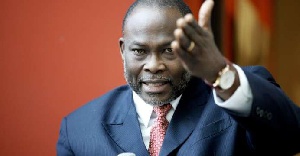Former Trade minister and NDC flagbearer hopeful Dr. Ekwow Spio-Gabrah has expressed doubt over the one million jobs the Akufo-Addo government claims to have created over the last 16 months that it has been in office.
The government through the labour minister has claimed that it has created a little over one million jobs between January 2017 and April 2018.
Ignatius Baffour-Awuah disclosed on Tuesday at the launch of the Nation Builders’ Corps (NABCO) in Kumasi that: “This happened within the formal economy. So what happened within the informal economy is not even accounted for here.”
A document released by the government Wednesday broke down into specifics the various areas of the economy where the jobs have been created.
Speaking to Starr News Wednesday, Dr. Spio-Gabrah said the numbers being touted by the government appear unrealistic.
“If these jobs are created by the government themselves, then they should be able to put up the list of beneficiaries. At the rate the administration is creating jobs, there will be no unemployment in Ghana after 4 years if indeed these jobs exist. But with all due respect, the number of jobs created appear totally manufactured and fictitious. The government should tell us the impact of the total wage bill as a result of the jobs created,” he said.
Commenting on the newly launched Nation Builders Corps initiative, the former Communications minister said:” This is just a re-brand of the YEA, and they are pretending to have started a new initiative with a new logo and all”.
Meanwhile, President Akufo-Addo has stated that one of the major preoccupations of his administration has been to put in place sound economic fundamentals that promote the enabling atmosphere for entrepreneurs to thrive and create jobs.
According to him, “It has taken a lot of hard work and strong nerves to stay on the straight and narrow path to get the economy to start growing from the deep hole it was in. I am happy to report that all the indicators are pointing in the right direction.”
The President stated that GDP growth rate has more than doubled, from 3.6% in 2016, the lowest in two decades, to 8.5% in 2017; inflation has reduced from 15.4%, at the end of 2016, to 10.4% in March 2017; interest rates are going down; the cedi has stabilised; fiscal deficit has reduced from 9.3% in 2016, to 6% of GDP in 2017; adding that there are positive signs of revival in the industrial sector, with growth increasing from an abysmal negative 0.5% in 2016 to 17.7% in 2017.
General News of Thursday, 3 May 2018
Source: starrfmonline.com

















